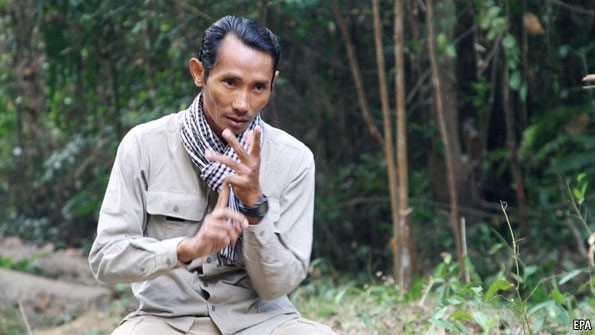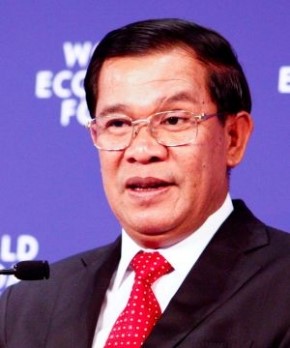

 字體:小 中 大
字體:小 中 大 |
|
|
|
| 2018/05/02 22:11:57瀏覽71|回應0|推薦0 | |
CambodiaBlood trailThe forest witnesses an unsettling deathMay 5th 2012 | PHNOM PENH | from the print edition
Chhut Vuthy, tireless campaigner
THE killing of Chhut Vuthy has shaken Cambodia. A well-known environmentalist and founder of the Natural Resource Protection Group, he had travelled to Koh Kong province in the west of the country to try to film illegal loggers. He was in a heavily forested area near the construction of a 338-megawatt hydropower dam being built by China Huadian, one of China’s five biggest power generators. The project is one of four dams which have drawn widespread criticism because of adjacent logging, and the impact the dams could have on wildlife and the livelihoods of local villagers. How Mr Chhut Vuthy was killed is not clear, but the official explanation has raised eyebrows. The Cambodian army claims that he was taking photographs without permission. He was confronted by a military police officer who demanded he hand over his camera. An argument followed, says the army. Guns went off, and when the officer realised he had killed the environmentalist, it says, he turned his AK-47 on himself, managing to pull the trigger twice to shoot himself in the stomach and chest. In this section · Mr Nice Guy and Mr Ten Percent · »Blood trail Related topics · China · Cambodia Mr Chhut Vuthy’s family insists a third person was involved, and after his funeral on April 28th hundreds of family, friends and human-rights activists demanded a full inquiry along with assurances from the government that their safety would be guaranteed. Two journalists were with Mr Chhut Vuthy when he was killed. A Canadian reporter and her Cambodian colleague say they did not see who pulled the trigger after their car was confronted by a group of soldiers. They ran into the bush and sought shelter with locals, but say they heard one of the soldiers say loudly in Khmer, “Just kill them both.” Mr Chhut Vuthy’s death is the highest-profile killing in Cambodia since a trade union leader, Chea Vichea, was shot dead in 2004. Three women were also shot in February as they campaigned for better working conditions at a factory supplying Puma, a German sportswear company. All three survived, but the alleged gunman, Chhouk Bandith, a district governor, was arrested only after local media reported that he was being hidden by politically connected friends. He was charged with causing “unintentional injuries”. from the print edition | Asia Blood trail May 6th 2012, 12:07
A world-class scholar is very hard to be cultivated. I have seen such incident many times when there is a conflict between law and scientific theories. To report this news can increase the awareness of the respect for one another. Basically, I think that the environmental protection had better be put in advance, although economic growth is also important for this impoverished place.
Cambodian economy recently grows fast when Cambodian Prime Minister Hun Sen pays attention to both native environment and economic progress. Chinese, Taiwanese, South Korean along with Japanese run business busily in Phnom Penh, making the promise of a more prosperous future in Cambodia. In addition to China’s President Hu Jing-tao visiting in Cambodia about a month ago, Japan assist Cambodia to build Sihanoukville Port Special Economic Zone successfully and start to work on the 70 hectares of land.
Also, both natural resource and artificial construction of Cambodia are beautiful bounty in Southeastern Asia famously. The Mekong and the Tônlé Sap are the most fertile regions. Temple of Angkor Wat, in accordance with natural environment, symbolizes the ever-brilliant empire in Cambodian history. For a long time, Angkor, the capital of the Khmer Empire from the early 9th century to the mid-15th century, had ever been the political centre of Southeastern Asia. In that days, Angkor was also a crossroad of numerous religion, including traditionally local legend, Hinduism, Buddhism and Islam. In 1992, Angkor was designated a World Heritage Site by the United Nations Educational, Scientific and Cultural Organization (UNESCO).
Rather than Khmer Rouge and Pol Pot, Hun Sen, who I have given suggestion to, practises the opening attitude to politics and economics. Cambodia is somehow unstable and has well-ordered societies for a decade, but Cambodia can catch up with the footstep of Vietnam or the uprising Myanmar.
Recommended 9 Report Permalink 這篇所哀悼的是一位很致力於生態保護的學者Chhut Vuthy,他也是已被解散的救國黨的重要成員。官方的說法是誤殺,在他從事抗議中國大量援助柬埔寨之時,有這則不幸的消息也讓長期執政且為東南亞國協裡面最親中的韓森將軍當局一個反省。中國政府及企業的援助不過並不因此減緩。 筆者開始著力於東南亞,除了前一年的新加坡之外,從這篇起開始增加份量,筆者因為在和中國國務院往來,也因為涉及陳水扁前總統相關事務,這方面提過一議,所以現在算起來執政近33年的韓森總理本人是東南亞國協中1990年之後筆者最熟稔的一位。可見於去年筆者二月左右提及柬埔寨曾經差點和李登輝和陳前總統台灣當局兩度建交卻擦肩而過的內幕。既是當過和在兩岸關係中唯一靠近台灣當局的,也是在2010-12年南海危機中因為是東南亞國協主辦國而以程序駁回,幫中國政府保住面子的最親密盟邦,後來有所謂駁斥日本大使風波,和最密集拜會李克強總理及中資百分比數字佔東南亞各國首位均可見一斑。具體而言比如協助證券交易所開張、20%柬國海岸線的深水港建立(http://www.bbc.com/zhongwen/trad/world/2016/09/160902_press_review)、首都金邊的「中國小上海金融城」的建立(紐約時報中文版分析:https://cn.nytimes.com/business/20180110/cambodia-real-estate/zh-hant/),甚至是中柬軍事合作,見於三月的15日聯合軍演,都證明中柬關係是東南亞國協中最緊密可靠者。韓森則在2015年在筆者也有長期追蹤的官方臉書曾經宣佈要交棒給就讀過美國西點軍校的大兒子。 Chhut Vuthy是Open Development Cambodia (ODC)的創始成員,這團體政治立場偏向反對執政的柬埔寨人民黨,不過柬並非獨裁國家,其後續在赤色高棉審判問題及滯留難民問題上,於人權方面有很大的進步,並且儘量配合當時美國前國務卿希拉蕊的立場,一度合緩在柬埔寨的中國與美日等國的利益衝突問題。救國黨並沒有在其後及前兩年的一次暗殺事件中獲得決定性的支持,甚至最後被法院解散。民眾還是以經濟為重,在繼續歡迎中資大開發的同時,也有在自身利益及社會階級立場矛盾下過活。此後相較於東南亞其他各國,筆者對柬國有較多進一步的後續分析和評論,韓森總理還很有趣地透露除了自己一些中國血統情結,已故國王西哈努克的母親是筆者父親家的福建同安的族奶奶沒有錯。在此很謝謝韓森總理他們的考據。 *筆者在經濟學者雜誌的討論區貼出最近一篇是「Why Cambodia Cosied up to China, Jan 30, 2017」,裡面有聊到柬埔寨在脫離法國而獨立之後的現代史概略。The film "The Killing Fields" vividly depicts the carnage wreaked by Pol Pots followers in Cambodia.(2018,07,13補充,Barron Basic Word List) *附一篇6月8日的文章 Hun SenStrongman of CambodiaJun 8th 2012, 11:06 by L.H. | PHNOM PENH
THE prime minister has no shortage of critics hoping for his demise. Brad Adams of Human Rights Watch (HRW), a New York-based NGO, recently compared Hun Sen with the series of notorious autocrats recently ousted from power in the Arab world. Ben Ali, Mubarak, Qaddafi: men who ruled by threat and force. His sentiments were backed loudly by one of Cambodia’s long-serving opposition leaders, Sam Rainsy. He insists from self-imposed exile that his country is primed for an Arab spring and reckons he’s the man to lead it. (The Cambodian government regards him as a fugitive, having convicted him on charges of spreading false information.) Their problem is that Hun Sen, who according to Mr Adams’s calculations is one of the world’s top-ten longest-serving political leaders, keeps on winning elections—as he did again, just this week. In regional terms Cambodia’s commune elections are a minor affair. The country has 1,633 communes, or clusters of villagers, which choose their local leaders once every five years. Their main value for outsiders is in offering rare insight into the prime minister’s popularity and that of his Cambodian People’s Party (CPP). The CPP already held an overwhelming majority of communes, which reflects the enormous support it enjoys among Cambodia’s predominantly rural voters. The ruling party went into the polls with control of 1,592 of the communes. It appears set to match that and also to increase its majorities within the communes. At last count it had won 11,459 seats, which is about 200 more than they took at the previous poll, five years ago. Nine other parties contested the CPP in Sunday’s poll. More than 15,000 national and international observers were tasked with keeping watch for voter fraud, intimidation and other “irregularities”. The complaints the observers heard were not insignificant. They included charges that the government used the police and army to help it campaign; that the opposition’s access to the media was limited; and that radio stations were instructed by the information ministry not to carry certain stories. Influential CPP officials were seen at polling booths, where they are alleged to have tried intimidating voters into supporting their candidates. But even this hardly compared with the spate of election-related murders and bullying that plagued voting in the 1990s and early 2000s At least 20 deaths were blamed on the violence that marked the first commune polls, in 2002. An independent watchdog organisation, Comfrel, said this election marked an improvement on previous polls. There were, at least, fewer instances of violence, intimidation and the rest. The biggest change in this poll was a sharp drop in the rate of participation. It may have been low as 54%, compared with the 87% rate recorded 10 years ago, or the 84% seen at the general elections of 1993—when 380 people were killed in the attendant violence. Critics contend that fewer people voted because there is widespread disenchantment with the incumbent as well as a sense of inevitability about the outcome. That may be, but it’s worth noting that only the opposition parties suffered a fall in votes. The most obvious outcome was that the Sam Rainsy Party (SRP) lost ground in their traditional strongholds, like Phnom Penh, the capital, after failing to capitalise on the perennial issues that plague Cambodia. Corruption, a culture of impunity among the politically connected and violent land-grabs have sullied the government’s reputation. This was underscored by the recent killing of a prominent environmentalist, Chhut Vuthy, and the jailing of 13 women who had become visible for their protests against land-grabs in the capital. What many of Hun Sen’s critics fail to understand, particularly those who would hope to inspire an Arab-spring-like uprising, is that Cambodians remember very well what a dreadful business civil war can be. In 1998 Hun Sen achieved where UN promises had failed and ended 30 years of a conflict that had left millions dead. For that reason many Cambodians are still prepared to overlook the bloody indiscretions and brutal tactics of the ruling party—and willing to carry Hun Sen to repeated victories. The chances of fermenting a Khmer spring are remote, and might seem plausible only to a self-imposed exile abroad. (Picture credit: Wikimedia Commons)
|
|
| ( 心情隨筆|心情日記 ) |











